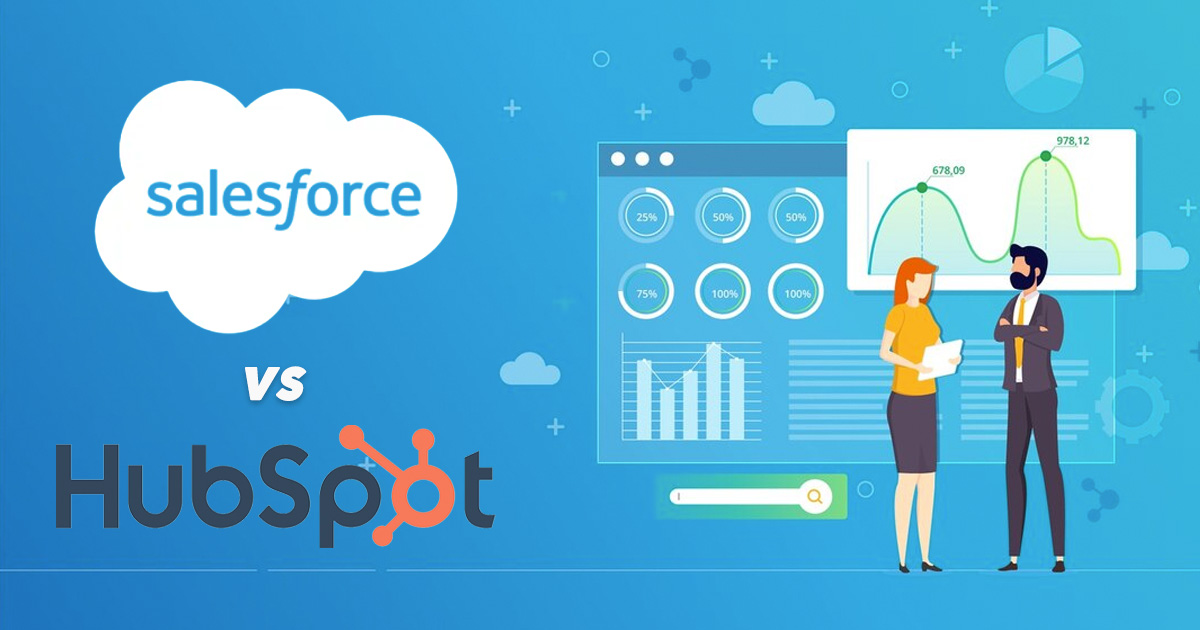Salesforce vs HubSpot: A Detailed Comparison of CRM Features

Customer Relationship Management (CRM) systems are vital for firms that want to optimize operations, build customer relationships, and increase revenue. Salesforce and HubSpot are two of the most well-known CRM platforms. Both platforms provide tremendous functionality, but they address distinct demands and budgets.
To help you choose the right CRM solution, you need to explore Salesforce and HubSpot, comparing their features, pricing, and use cases.
Getting To Know Salesforce and HubSpot
Salesforce is a sophisticated CRM platform intended for businesses of all sizes, particularly corporations. It provides a wide range of tools for sales, marketing, customer support, and analytics. Its modular system allows businesses to tailor solutions to their specific needs through its various “Clouds” (e.g., Sales Cloud, Service Cloud, Marketing Cloud).
HubSpot is a CRM platform that is easy to use and affordable. While it caters to businesses of all sizes, it is most popular among small and medium-sized firms. HubSpot offers a comprehensive platform for sales, marketing, and customer care, with an emphasis on inbound marketing tactics.
Difference Between Salesforce and HubSpot
The difference between Salesforce and HubSpot lies in their approach to CRM solutions. Each platform has its own set of features that are customized for the demands of businesses of varying sizes.
Core Features
Salesforce includes advanced tools like lead scoring, opportunity management, and detailed reporting. It also has a large app marketplace with plenty of customizing options. HubSpot, on the other hand, concentrates on key sales tools such as email monitoring, meeting scheduling, and pipeline management. Its built-in marketing automation makes managing campaigns simpler for users.
User Interface
Salesforce is powerful but can feel overwhelming due to its complexity. Most users need training to navigate its features efficiently. HubSpot is well-known for its intuitive and user-friendly design. Its UI is basic, allowing users to get started without much training.
Automation Capabilities
Salesforce provides advanced automation, allowing businesses to develop complicated workflows that are suited to their needs. HubSpot offers simpler, more user-friendly automation features, making it an excellent solution for small organizations seeking to simplify operations without a high learning curve.
Reporting and Analytics
Salesforce stands out with its robust reporting, allowing users to create detailed and customizable reports and dashboards for deep insights into sales performance. HubSpot offers basic reporting features that work well for small businesses, but it may not meet the needs of larger enterprises.
User Experience
When comparing these two platforms, ease of use is a key consideration. HubSpot’s interface is simpler and easier to navigate, which reduces onboarding time and helps teams adopt it more quickly. In contrast, Salesforce’s interface is often seen as cluttered and complex, requiring dedicated training for team members to use it effectively.
Customer Support
When it comes to support options, HubSpot offers chat and email support along with an extensive knowledge base. However, its free version has limited customer support. Salesforce provides more comprehensive support, including 24/7 assistance for paid plans, extensive documentation, and active community forums.
Integration Capabilities
Salesforce connects with over 3,400 third-party apps through its app marketplace, making it ideal for businesses that require specialized tools. HubSpot supports around 500 integrations, covering essential tools for small businesses without overwhelming users with too many options.
AI Features
HubSpot uses AI to enhance efficiency with predictive lead scoring and automated task management, helping sales teams focus on high-priority leads. Salesforce takes AI to the next level with its Einstein platform, which offers advanced customer insights and precise sales forecasting.
Pricing
When comparing HubSpot and Salesforce pricing, there are some notable differences. HubSpot offers a free version, a big advantage for startups or small businesses wanting basic CRM tools at no cost. Salesforce, on the other hand, does not have a free plan but includes more advanced features in its entry-level offering.
HubSpot’s pricing starts at $15 per user per month (billed annually), while Salesforce’s entry-level plan begins at $25 per user per month. For enterprise plans, HubSpot charges $500 per user per month, compared to Salesforce’s $150 per user per month. Add-ons with HubSpot start at $5 per month, while Salesforce’s add-ons start at $25 per month.
HubSpot’s free option makes it appealing for smaller teams or those on tight budgets, while Salesforce caters more to businesses needing robust features right from the start.
Target Audience
HubSpot is an excellent choice for small businesses and startups seeking a cost-effective, user-friendly CRM. Its free version is ideal for budget-conscious users who want to try a CRM without committing financially. For those with straightforward sales processes, HubSpot’s basic features are likely sufficient without needing upgrades.
Salesforce is better suited to large organizations with sophisticated sales processes that require extensive customization. It is also perfect for data-driven enterprises that require sophisticated analytics and reporting. Businesses requiring extensive integration with third-party tools will find Salesforce’s large app marketplace particularly beneficial.
HubSpot CRM or Salesforce: Which Fits Your Growth Strategy?
The decision between HubSpot and Salesforce is more than simply about features or price; it also considers your business objectives. HubSpot is best for steady, simple growth, while Salesforce suits businesses ready to handle complexity and scale quickly. Your CRM should match how you want to grow now and in the future.
